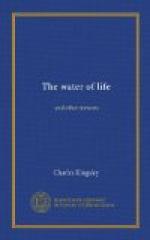They are the laws of the living God: not the laws of nature, or fate, or necessity—all three words which mean little or nothing—but of a living God in whom we live, and move, and have our being; whose word—the creating, organizing, inspiring word—runneth very swiftly, making all things to obey God, and not themselves.
And they are the laws of a good God; of a moral God; of a generous, loving, just, and merciful God, who, as the Psalmist reminds us (and that is the reason of his confidence and his joy), while He telleth the number of the stars, and calleth them all by their names, condescends at the same time to heal those who are broken in heart; of a God who, while He giveth fodder to the cattle, and feedeth the young ravens who call on Him, at the same time careth for those who fear Him, and put their trust in His mercy; of a God who, while His power is great and His wisdom infinite, at the same time sets up the meek, and brings the ungodly down to the ground; of a Father in heaven who is perfect in this—that He sends His sun and rain alike on the just and the unjust, and is good to the unthankful and the evil; of a Father, lastly, who so loved the world, that He spared not His only-begotten Son, but freely gave Him for us, and has committed to that Son all power in heaven and earth;—all power over the material world, which we call nature, as well as over the moral world, which is the hearts and spirits of men—to that Word of God who runneth very swiftly, who is sharper than a two-edged sword, and yet more tender than the love of woman; even Jesus Christ the Saviour, the Word of God, who was in the beginning with God, and was God; by whom all things were made; who is the true Light, which lighteth every man that cometh into the world, if by any means he will receive the light of God, and see thereby the true and wise laws of Nature and of Spirit.
This is our God. This is He who sends food and wealth, rain and sunshine. Shall we not trust Him? If we thank Him for plenty, and fine weather, which we see to be blessings without doubt, shall we not trust Him for scarcity and bad weather, which do not seem to us to be blessings, and yet may be blessings nevertheless? Shall we not believe that His very chastisements are mercies? Shall we not accept them in faith, as the child takes from its parent’s hand bitter medicine, the use of which it cannot see; but takes it in faith that its parent knows best, and that its parent’s purpose is only love and benevolence? Shall we not say with Job—Though He slay me, yet will I trust in Him? He cannot mean my harm; He must mean my good, and the good of all mankind. He must—even by such seeming calamities as great rains, or failure of crops—even by them He must be benefiting mankind. Recollect, as a single instance, that the great rains of 1860, which terrified so many, are proved now to have saved some thousands of lives in England from fever and similar diseases. Take courage; and have, as the old Psalmist had, faith in God. Believe that nothing goes wrong in this world, save through the sin, and folly, and ignorance of man; that God is always right, always wise, always benevolent: and be sure that you, each and all, are —




